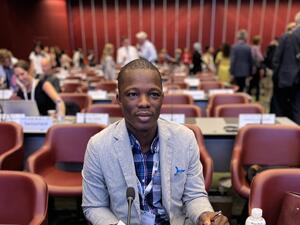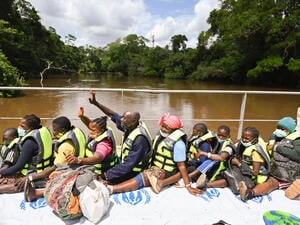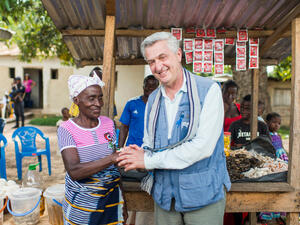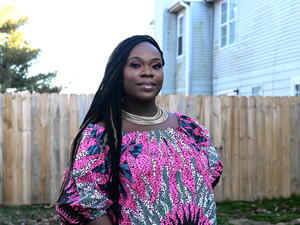Feature: The good women of Sierra Leone
Feature: The good women of Sierra Leone

Refugee women and returnees in Sierra Leone are given vocational training to help them become more self-sufficient.
FREETOWN, Sierra Leone (UNHCR) - They come from neighbouring countries, but crossed paths in the tangled web of war in West Africa.
Manu Famuley, a Liberian matriarch, recently fled to Sierra Leone to escape the fighting in her country. Massa Bossa, a Sierra Leonean woman, recently returned from exile in Liberia to embrace the fragile peace in her homeland. Both women passed through the same refugee camp without ever meeting, but they share similar stories that reflect the suffering and strength of the region's refugee women.
Manu, 32, lost her husband, a soldier, in the Liberian civil war in 2000. Driven out of her home with three children and no working experience, she sold fufu (boiled cassava) in Samukai refugee camp, just outside the capital, Monrovia, to support the family.
In June, Manu and her children fled the escalating violence in Liberia, walking three days to the border with Sierra Leone, where they were stripped of their meagre belongings. "The soldiers took everything from me - my bags, my clothes, even the children's clothes. We were left with only what we had on our body," she recalls.
But she is one of the lucky few who managed to get across the border without getting physically harassed. Entering Sierra Leone, she met UNHCR staff at the Gondama entry point. They registered her and put her on a convoy to a way station. From there, she was moved to Gerihun refugee camp in Bo district, southern Sierra Leone, where she presently lives with her children.
But that was not the end of her worries. "I found that most booths at Gerihun were taken, so I had to move into one that was not complete," she says, adding that without a husband or male relatives, no one is willing to help her complete the structure. She lacks the skills to do it herself, and has no money to hire a construction worker.
So Manu and her children have been living in a roofless house. "It is very cold and now it is the rainy season, so it rains on us." She hopes, however, to be able to move into one of the new camps now being constructed by the UN refugee agency.
While Manu dreams of a new home in Sierra Leone, Massa has just returned to the country after 11 years of exile in Liberia.
"I am very happy," says Massa, 29, who recently arrived in the Sierra Leonean capital of Freetown under UNHCR's sea repatriation operation. "Finally I see my country, which I left in 1991."
Massa hails from Malema chiefdom in Pujehun district, southern Sierra Leone. She fled to Liberia when her home was attacked during the civil war. Without the support and protection of her husband, she started her long and difficult journey, walking two days to the Liberian capital of Monrovia.
She was sick and starving when she arrived, but soon received assistance from the UN refugee agency at Samukai refugee camp. Her living conditions started to improve gradually. Thanks to UNHCR's implementing partners, she learnt a new trade: tailoring.
Before her flight, Massa was doing small-scale trading in her village. When she returns home, she hopes to resume this activity and to improve her skills as a seamstress. Her husband, who is currently in Liberia attending a vocational training course, will hopefully join her next year.
Getting off the boat in Freetown after her 28-hour voyage, she can hardly believe she is home. "I am back," she says with a smile, "and I feel great."
While UNHCR officials finalise the formalities with customs officials and security personnel, Massa looks nervous as she watches her luggage being loaded onto a convoy truck from UNAMSIL, the UN peacekeeping mission in Sierra Leone. She says she is anxious about starting a new life, but is brimming with ideas about the future.
Massa will join the convoy led by UNHCR vehicles, travelling over bumpy and rugged roads further into the interior. The returnees will first stop at Baiima way station, near Bo district, where they will spend one night. Her final drop-off point is Pujehun town, where she will receive kitchen sets, plastic sheeting, tarpaulin, blankets, lanterns, plus two months' food supply and a secondary travel allowance to enable her reach her final destination.
She has relatives in Pujehun district while her brothers and sisters are in Freetown. She would like to visit them as soon as possible.
Meanwhile, at Gerihun camp in the neighbouring Bo district, Manu's eldest child is attending primary school while the two younger ones are being looked after in the day care centre. This gives her the opportunity to take part in vocational training offered at the camp, where she is learning to bake and to make soap.
Once she completes her vocational training, Manu hopes to receive money from the camp's micro-credit society to start her own business. "I thank UNHCR for caring for us and training us so that we can help ourselves," she says.
Though far from home, Liberia is never far from Manu's mind. Like her Sierra Leonean counterpart, Massa, she dreams of returning to her country one day. "At least it is better now," says Manu. "I have training. I can hope for better things in the future even when I go back to Liberia."
By Francesca Fontanini and Idrissa Conteh
UNHCR Freetown






